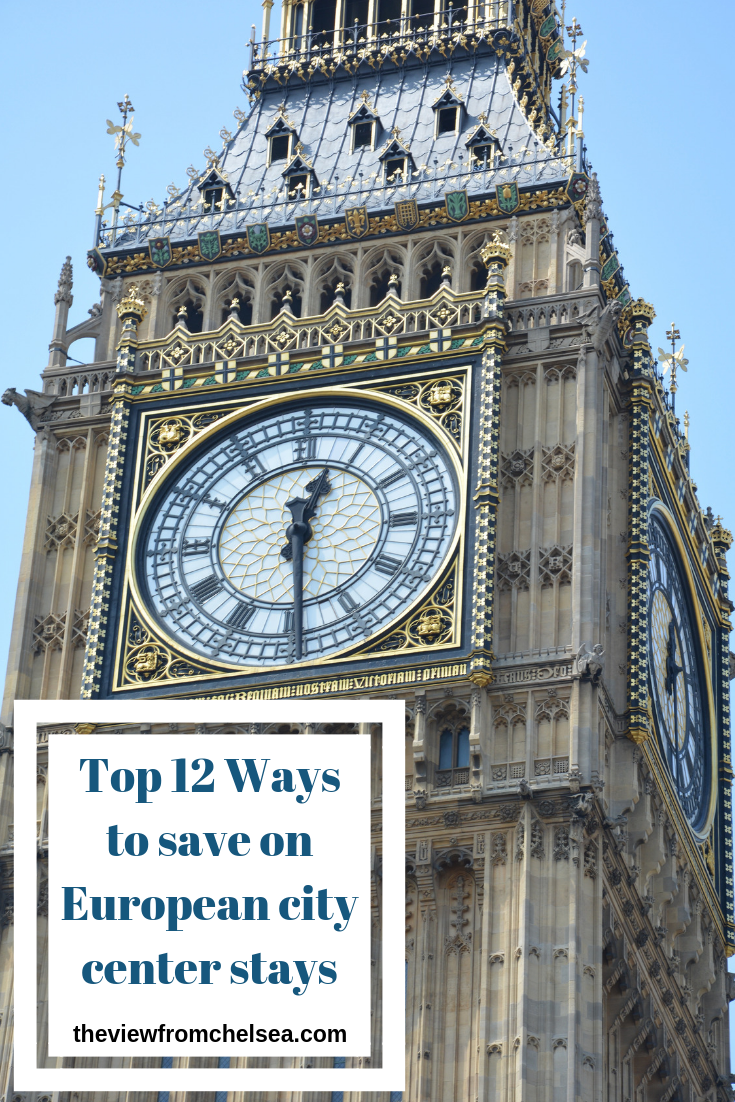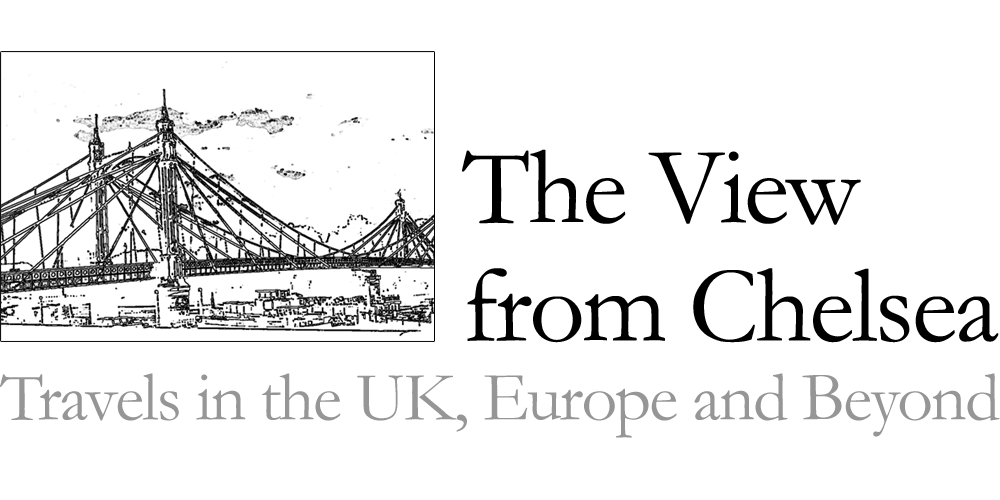by Ferne Arfin 12 May 2019
12 Top ways to save money on European city stays
Wondering what a picture of a bucolic river scene is doing on a story about saving money on city stays? Perhaps it would surprise you, then, to learn that the famous, often painted view of the Thames from Richmond Hill is a mere 10 minute Tube ride plus a 15 minute walk or bus ride from Harrods in the center of London.
Imagine crossing the Atlantic to see England and France for the first time but giving London and Paris a miss. Those cities as well as many more European capitals – Rome, Madrid, Berlin, Budapest, Athens, Lisbon, Zurich and Geneva, Edinburgh and Glasgow – are probably somewhere on your must see list. But they all have a reputation – rightfully so – for budget busting accommodations.
Don’t let that put you off visiting or staying longer than a day or two. It’s true that the average cost of city center hotel rooms is high. According to statistical research tool Statista, the average cost – in Euros – of a Paris hotel room in 2019 is €241; London is €163 and Geneva, with the highest daily rate, is €245.80. And that’s just an average. The thought of paying that much for a night in a mediocre (and possibly grim and dirty) hotel can be discouraging.
But use your imagination and you’ll find there are other kinds of lower cost accommodations to choose from as well as ways to save on conventional hotel rooms. Consider these ideas:
1. Stay on the Edge
In most places, you will pay a premium for staying in town and city centers. Actually, you may be able to save as much as 40% by staying on the edge of town. Places like Richmond and Greenwich are suburbs but technically part of London. They have good local transportation connections to the West End as well as many local attractions in their own right. Paris, Rome, Athens and other modern European cities all have pleasant suburbs or alternative residential areas within easy reach of the main attractions. Check out the public transportation situation with the local tourist board of the city you are planning to visit. Some cities, such as Manchester, even have free shuttles or buses from the outskirts to the center. If you’re not familiar with the city, it’s also a good idea to research neighborhoods before you go to make sure the location you’re looking at on the edge of town is safe and someplace you’ll feel comfortable.
2. Choose a Guest House
Smaller hotels, with fewer hotel type services, are called guest houses in Britain. In France, and elsewhere in Europe they may be called pensions, auberges or maison d’hôtes offering optional meal plans. Do you really need to pay for such hotel extras as in-room, direct line telephones and business centers, spas and pools you may not have time to use? And if you can live without a concierge, a hotel bar, or the usual front desk services, you can chop quite a bit off your bill. Guest houses are similar to B&Bs but usually larger.
3. Try an owner-occupied B&B
Smaller B&Bs and farmhouse B&Bs are inexpensive and great ways to meet Europeans on their own turf. Staying in a family occupied B&B is a bit like being someone’s house guest. You might have to share a bathroom (or not) but you might also get the best room in the house. Breakfast will be homemade and you’ll have a chance to chat with your host and other guests. And the best part is that it will cost a third as much as an average priced hotel. In France this kind of accommodation is called chambre d’hôtes or maison d’hôtes and offers bed and breakfast. If an optional evening meal is offered, it’s called table d’hôtes
4. Consider going during the off season
Every city has one. You just have to decide whether what you like doing can be done during that time of year. In Paris, it might be August when all the locals leave town for their own vacations. Flights and some holidays may cost a bit more but there are plenty of free things to do that bring your total cost down. Quite a few restaurants will be closed but you won’t starve and the queues will be shorter for many top attractions. Courtney Traub, whose blog Paris Unlocked has loads of good ideas, offers interesting advice about which Parisian seasons might be right for you. In the UK, January and February are the cheapest. If you already live in a cold climate, you won’t be put off by the weather. Days are very short and outdoor attractions close earlier. But the museums, theaters, clubs, pubs and shops do a roaring business. It’s probably not the best time of year for outdoor enthusiasts. On the other hand, if you’re a fan of bright lights and big cities, winter can be a great — and cheaper — time to visit.
5. Try house swapping
House swapping done properly, through a legitimate agency, can be a safe way to save thousands on vacations yet live in comfort like a local. If you’ve seen reruns of the 2007 Cameron Diaz and Kate Winslet movie “The Holiday” (which seems to be a Christmas season TV regular in the UK), the idea of exchanging your home with a like-minded stranger may have crossed your mind – especially if you live in a popular destination city or the middle of beautiful touring country. There are dozens of home exchange or holiday swap organizations, some more well-established than others. Most work in a similar way: you join a membership organization that provides house swap candidate listings, some screening tools and perhaps insurance services. They perform the introductions and then its up to you – sometimes with online tools – to negotiate your arrangements. The Telegraph published a useful list of tips and pointers along with a list of recommended house swapping clubs that you can find here. And the Guardian offers a free home exchange listing service in connection with their Guardian Holidays business. Just make sure you cover all the bases – insurance, utility bills, access to a car, care of pets, damage deposits – before you jump into anything.
6. Stay in a reputable chain hotel
What the international chain hotels lack in charm, they more than make up for in price and reliability. If you’re on a touring vacation, how much time will you really be spending in your room? As long as its decent, well located and clean, it’s probably all you need. Save up for a special hotel or B&B along the way by sticking to the tried, tested and cheaper chains for your short stopovers. Mary Anne Evans of Mary Anne’s France offers some insider info on hotel chains across France, here. The major international chains are especially good choices in major cities where they will be conveniently located and where you will be rushing from one urban attraction and activity after another anyway. And especially in urban centers, it’s wise to play a moderate, rather than a super cheap, price for the consistent level of quality the big chains offer – as this traveler discovered.
7. Negotiate a better deal
If you can, don’t pay for more than one night in advance. Then look around to see what else is available after you arrive. If the manager of your hotel thinks you might move to another hotel – and if your hotel isn’t full – you may be able to negotiate a better price. It never hurts to make an offer and, even at some of the fanciest hotels in town, you could get lucky.
8. Self-Cater
Small flats and apartments where you cook and clean for yourself are much cheaper than other kinds of accommodations. They are usually rented by the week in the high season but often they’re available for one or two night stays at other times of year. You could rent a house, big enough for five or six people, for a whole week, for not much more than the cost of a couple of nights for two in an average hotel. The local tourist authority can usually provide information about local rentals. Scour the self-catering recommendations in the on-line sites of the leading local newspapers. Check out Airb&b for vacation rentals with kitchens. In France, the wonderful Gîtes de France organization lists hundreds of vacation rentals. And TripAdvisor now lists bookable, self-catering vacation rentals (called holiday rentals in Europe) as well.
9. Rent an RV
They are called caravans or camper vans in Europe and some caravan parks are located within green or scenic areas very close to city centers. In Paris there’s a camping park in the 16th Arrondissement; in London there’s a Motorhome Club site in a nice, wooded area of Crystal Palace Park, as well as sites near the Olympic Park in Epping Forest and Lee Valley. GoCaravanning.com is a source of links to RV rentals all over the UK. Try Camping de Paris for places to stay within a stone’s throw of Metro stations. And for information about urban campsites in hundreds of cities worldwide, try Pitchup.com .
10. Give Hostels a Try
Hostels have come a long way from the days when they were rough and ready bunkhouses and camping barns for student backpackers. Though there are still plenty of those around, nowadays hostels cater to families and seniors, some have private rooms, some offer breakfasts and cooked meals, some have bistros and bars. It is even possible to hire an entire castle, at hostel prices, for a wedding or big family gathering.
What has not changed, though, is that they are usually the cheapest safe and clean rooms around.
11. Stay in a pub
If you think of pubs as just another word for bars, you’ll be missing a trick on some of the most charming, moderately priced places to stay and eat well in the UK and around Europe. Pubs, after all, originated as “public houses” and coaching inns – places where weary travelers could break their journeys with a rest and a meal. Now that people tend to drink less or drink more at home, some clever pub owners have converted their extra space into boutique hotels. Check out The Malt House in Fulham or The Windmill in Clapham Common, both urban London pubs that are also luxurious, moderately priced little hotels. Elsewhere in Europe, this sort of former coaching inn is a bit harder to find. Sometimes, in France, they are called auberges. The best place to start is with Logis Hotels (formerly Logis de France). This is a group of more than 2,000 small, usually family run inns and restaurants with rooms spread across France, Germany and Belgium. The majority are former coaching inns and quite a few are in major cities.
12. Search the Internet
Never book a hotel before checking out the many online, accommodation search engines first. Spending time searching for the best rates on the Internet can save a lot of money. In fact, many hotels have special Internet only rates and last minute Internet packages. Set aside enough time to do this and don’t go after the first attractive price you find. This kind of search can sometimes drive you mad but if you are looking to save money, it is worth the trouble.
“That view from Richmond Hill” by flicksmores is licensed under CC BY-NC-ND 2.0
Like this post? Please share and save.




 Ferne Arfin 2019
Ferne Arfin 2019 Ferne Arfin 2019
Ferne Arfin 2019
Trackbacks & Pingbacks
[…] 12 top ways to save money on European city stays […]
[…] For more tips on saving money while travelling in Europe, check out The View from Chelsea: 12 Top Ways to Save Money on City Stays in Europe […]
[…] (See related: 12 Ways to Save Money on City Stays in Europe) […]
Leave a Comment
What do you think?Please add your comments and suggestions here.